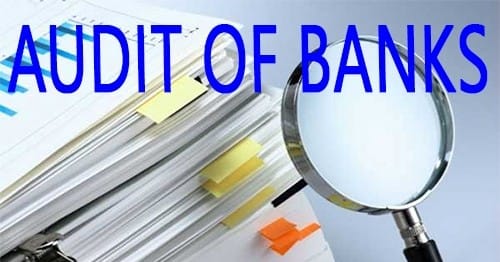Stock audit refers to the physical verification and assessment of the inventory or stock, which is held by an organization on a particular day. It is conducted periodically to ensure accuracy and reliability of stock records, prevent fraud, and assess the overall management of stock within the organization.
Banks conduct stock audits to verify and assess the stock or inventory of borrowers who have obtained loans or credit facilities. They perform stock audits to ensure the accuracy and adequacy of the collateral pledged by borrowers. Thus, banks use stock audits as a risk management measure. Let’s take a brief look at stock audits conducted by banks:
Objectives of Stock Audit by Banks
- Verification of Collateral: Verify the existence, quantity, quality, and condition of stock pledged as collateral by borrowers against loans or credit facilities.
- Assessment of Valuation: Determine the current market value or liquidation value of the stock to assess its adequacy as collateral for the loan amount sanctioned.
- Risk Mitigation: Identify and mitigate risks associated with potential overvaluation, obsolescence, or inadequate security coverage provided by the stock.
- Compliance and Documentation: Ensure compliance with loan agreements, security documents, and regulatory requirements related to collateral management.
- Fraud Prevention: Detect and prevent fraud, misrepresentation, or misappropriation of stock pledged as collateral by borrowers.
Process of Stock Audit by Banks
1. Pre-Audit Planning
- Review and analyze loan agreements, security documents, and borrower profiles to understand the terms and conditions of the loan and collateral requirements.
- Define and establish audit objectives, scope, and methodology based on the loan size, business nature, and risk assessment.
2. Physical Verification
- Conduct physical verification of stock items held by the borrower at their premises, warehouses, or designated storage locations.
- Count and inspect the stock to verify its existence, quantity, quality, and condition compared to the details provided in collateral documents.
3. Documentation Review
- Examine documentation related to stock movements, receipts, withdrawals, inventory records, and accounting entries.
- Verify accuracy and completeness of stock records maintained by the borrower and reconcile with physical stock counts.
4. Valuation and Assessment
- Assess the market value or liquidation value of the stock based on prevailing market conditions, industry norms, and appraisal methods.
- Evaluate the adequacy of stock valuation to cover the loan amount and assess risk exposure for the bank.
5. Audit Reporting
- Prepare audit reports detailing findings, observations, discrepancies, and recommendations for mitigating risks and improving collateral management.
- Communicate audit findings to bank management, including assessment of collateral adequacy and compliance with loan covenants.
6. Follow-Up and Monitoring
- Monitor the implementation of audit recommendations and corrective actions by the borrower to address identified deficiencies or discrepancies.
- Conduct periodic reviews or follow-up audits to ensure ongoing compliance with collateral requirements and risk mitigation measures.
Importance of Stock Audit by Banks
- Risk Management: Mitigate credit risk by ensuring that the collateral provided by borrowers is sufficient, valid, and accurately valued.
- Asset Quality: Maintain the quality of assets on the bank’s balance sheet and reduce the likelihood of non-performing assets (NPAs) due to inadequate collateral.
- Compliance: Ensure compliance with regulatory requirements, internal policies, and best practices in collateral management and risk assessment.
- Fraud Prevention: Detect and prevent potential fraud or misrepresentation of collateral by borrowers, protecting the bank’s interests and financial stability.
In conclusion, stock audit by banks is a critical risk management practice. The aim of stock audit is to verify the adequacy and accuracy of collateral pledged by borrowers against loans or credit facilities. Bank mitigate their credit risk, by conducting thorough physical verification, documentation review, and valuation assessment. It also enhances the asset quality, and ensure compliance with regulatory requirements. Effective stock audits contribute to maintaining sound financial health, minimizing loan defaults, and safeguarding the interests of depositors and stakeholders in the banking sector.
At Ujjwal Gupta & Co
We, at Ujjwal Gupta & Co, are dedicated to delivering personalized, high-quality solutions tailored to meet your financial and business needs. With our team of professionals and a client-first approach, we ensure that every challenge is met with expert guidance and strategic insight.
We are dedicated to ensuring your business’s success by providing best service practice available in the industry and that too at a cost effective pricing. Our team of experts is excited to work with you and provide the support you need to thrive in the Indian business landscape.
Our only motive is to create Value for Our Clients and accordingly, have a Client Value System at our Office.
So, let us help you navigate the complexities of finance and compliance, empowering you to focus on what matters most — growing your business. Get in touch today, and take the first step towards financial peace of mind.
A stock and receivable audit is a specialized audit, which focus on examining the inventory (stock) and receivables (amounts owed by customers) of a business. It ensures that the company’s records of inventory and receivables are accurate and that the valuation methods used are in compliance with applicable accounting standards. This audit helps in verifying the physical existence of stock and the recoverability of receivables.
The audit is important because it helps to:
- Verify the existence, condition, and valuation of inventory.
- Ensure that receivables are collectible and properly accounted for.
- Identify discrepancies or issues related to stock management and customer collections.
- Ensure compliance with accounting standards (e.g., Ind AS or AS).
- Provide assurance to lenders (such as banks or financial institutions) that the company’s inventory and receivables are appropriately valued, especially if they are pledged as collateral for loans.
The external auditors conduct the stock and receivable audit and the same is generally appointed by the company itself. However, in some cases, the banks or financial institutions may provide or mandate stock audit to be carried out, wherein the companies have availed loans based on their inventory and receivables. The auditors can be Chartered Accountants (CAs) or audit firms specializing in inventory and receivable audits.
- Voluntarily by the company as part of internal controls or management reviews.
- Mandated by lenders (banks, NBFCs, etc.) when a company has pledged inventory or receivables as collateral for loans.
- In certain industries, such as manufacturing, trading, or retail, where stock plays a critical role in business operations.
- To comply with statutory requirements, especially for listed companies or businesses undergoing due diligence.
The key areas covered include:
- Physical verification of stock to confirm its existence.
- Valuation of inventory (raw materials, work-in-progress, and finished goods) to ensure it is recorded at the correct value as per the relevant accounting standards.
- Review of aging of receivables, to identify overdue or doubtful debts.
- Examination of stock movement (inward and outward) to verify accuracy and proper recording.
- Cut-off procedures to ensure that stock and sales are recorded in the correct period.
- Reconciliation of stock records with financial statements and identifying any discrepancies.
Inventory is valued using one of the acceptable methods under the accounting standards, which include:
- FIFO (First In, First Out).
- Weighted Average Cost Method.
- Specific Identification Method (used for unique items).
- Net Realizable Value (NRV): Ensuring that inventory is not overvalued, and is recorded at the lower of cost or NRV. The valuation process also considers factors such as damaged stock, slow-moving inventory, or obsolete items.
The receivable audit focuses on evaluating the company’s debtors (accounts receivable) to:
- Ensure that receivables are collectible and no bad debts are included in the accounts.
- Review the aging schedule of receivables to highlight overdue accounts.
- Assess the company’s credit policies and collection efforts.
- Check the provision for doubtful debts to ensure appropriate provisioning is done for unrecoverable debts.
- Ensure that receivables are correctly recorded and invoiced.
Common discrepancies include:
- Overstatement or understatement of stock or receivables.
- Inaccurate stock records or failure to account for damaged or obsolete stock.
- Unrecoverable receivables not written off or provided for as bad debts.
- Stock pilferage or theft, leading to discrepancies between physical stock and records.
- Incorrect valuation of inventory due to outdated methods or mismanagement.
- Misalignment between invoicing practices and receivable recording.
The benefits of conducting a stock and receivable audit include:
- Ensuring accuracy in the reporting of inventory and receivables.
- Detecting and preventing fraud or theft of stock.
- Helping management make informed decisions regarding inventory control and credit policies.
- Facilitating better cash flow management by improving the collection of receivables.
- Enhancing lender confidence in cases where loans are secured against stock or receivables.
- Supporting compliance with accounting standards and preparing for statutory audits.
The frequency of a stock and receivable audit depends on:
- Lender requirements: If mandated by a bank or financial institution, it may be conducted quarterly, half-yearly, or annually.
- Business needs: Some businesses, especially those with high stock turnover or substantial receivables, may conduct audits more frequently (e.g., monthly or quarterly).
- Industry practices: Companies in sectors such as retail or manufacturing may need to conduct stock audits more frequently due to the nature of their operations.
- For internal control purposes, businesses may voluntarily choose to perform regular audits to maintain accuracy and efficiency in stock and receivables management.
Why Choose UGC?

Client Centric Approach
Client is the key driver of our service offerings. Our approach to service offerings is based on a client centric and customized approach. Our specialized teams are a mix of technical and industry experience in order to serve clientele for their specific needs.

Team Work
We have built high performing teams supported by strong work ethic. Our team is a mix of experts, professionals and support staff from technical and varied academic, social and ethnic backgrounds. We believe diversification plays a vital role in motivating the team.

Quick Turnaround
We always endeavour for a quick turnaround time to serve our clientele. We are supported by an experienced and client focussed support teams to offer timely services to our clientele. In case of any business exigencies and time sensitive service requirements, you can always count on us.

Open Communications
We believe that open communication is the core principle in order to demonstrate trust, build long lasting and valuable relationships with clientele. We are committed to ensuring transparency in communication, service offerings and delivery. Our only motive is to provide professional services to our clients.

Client Value System
We value for the Client time and thus, we offer services that are value for money. Quality professional services are provided to our clients, so that they are able to achieve their desired results. We are a quality trademark in the industry and thus, our clients count on us always.

Quality in Delivering Work
Our service offerings are driven by quality and reviews at every level. We strive to provide a qualitative and value-added delivery to our clientele. At all times, we endeavour to provide exceptional client service by meeting client expectations and driving client satisfaction.




















